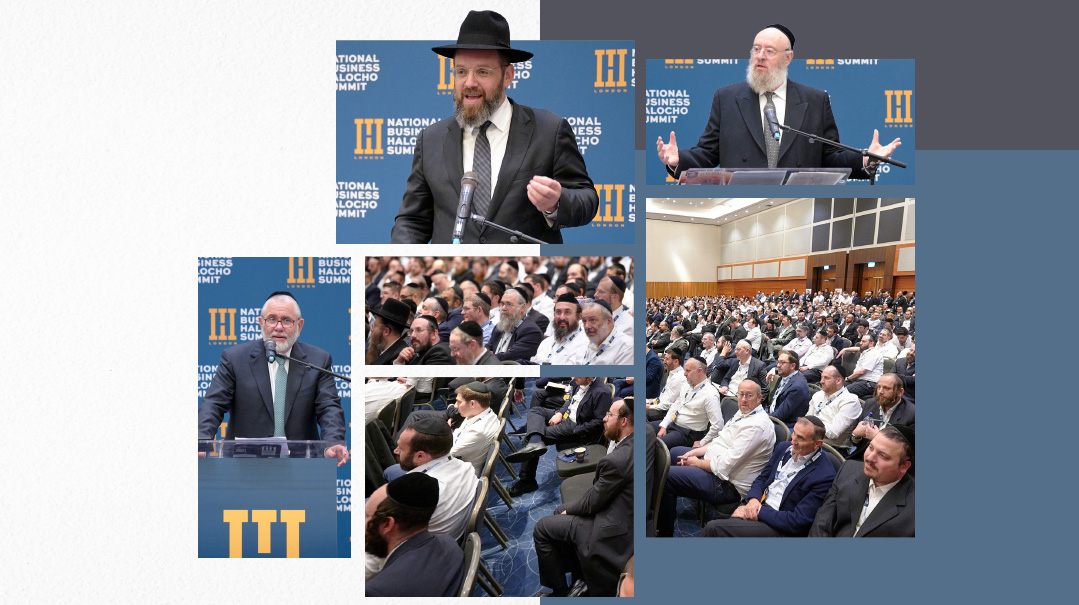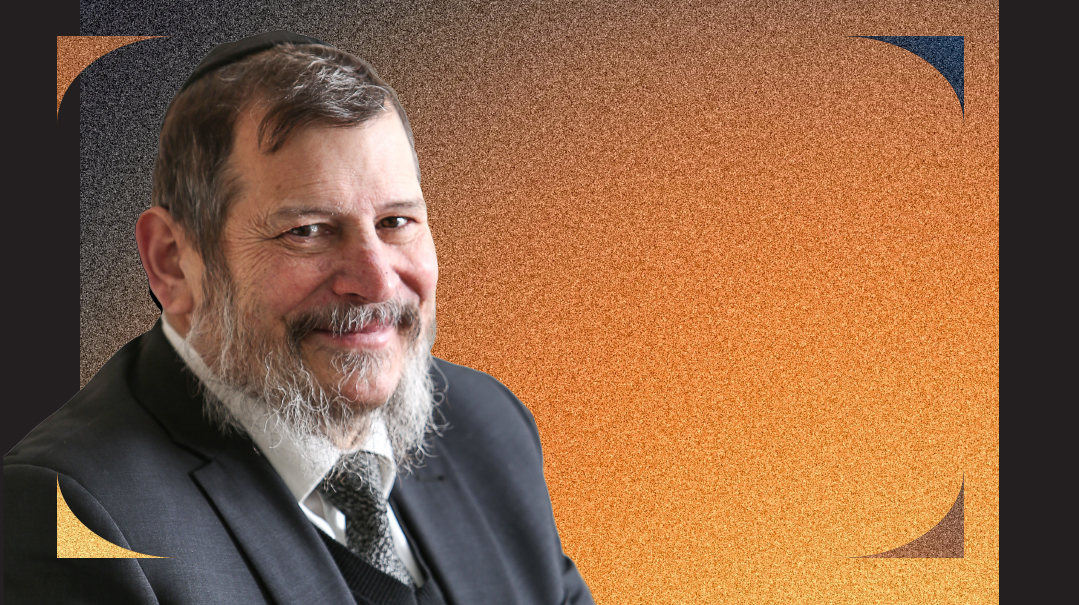Making It Work
| July 22, 2025H3 is the annual shot in the arm needed by every Jew in business who cares about his spirituality

Photos: Dudi Braun
Three years ago, ask a frum British fella in business to identify the industry’s high point and he’d probably have looked at you blank. Today, he wouldn’t blink. It’s H3. The annual one-day conference covering halachah, hashkafah, and hanhagah in business is jam-packed with hard-hitting workshops and a no-holds-barred look at the often challenging confluence of Jew and workplace.
For a conference that weds business with halachah, the location of this year’s London summit couldn’t have been more apt. The O2 Intercontinental Hotel sits right across the water from the headquarters of some of London’s most recognizable titans of commerce, business and banking: HSBC, Barclays, Citi, and the iconic Canary Wharf tower.
For the founder and chair of H3 in the UK, Reb Shaul Bodner, the mission is simple. “You make sure to tick your health and safety box, you’re careful about ticking your compliance box, and you’re right on top of your tax liabilities. But what about ticking the box of ensuring the Eibeshter is comfortable in your business, too?
“We were amazed to discover that the most dominant demographic among our attendees is the 25–35 age bracket,” says Mr. Bodner. “Here we have a new generation of young, frum men entering the business world — mainly straight out of kollel — grappling with thorny halachic and hashkafic issues. Questions around doing business with non-Jews, how to interact with females in the workplace, ribbis questions — these are all real life, daily issues. H3 is designed to address that.”
Rabbanim Roundtable
Dayan Yehoshua Posen is a member of London’s Federation beis din and an acclaimed expert in Choshen Mishpat.
Rabbi Yaakov Robinson is the executive director of the Midwest Council of Synagogue Rabbonim in Chicago, founder of the H3 summit (now held in seven cities across three continents) and a member of the executive leadership team at Agudath Israel of Illinois.
1.What are the top contemporary challenges facing Jews in the workplace today?
Rabbi Robinson:
We find that many people in the younger generation show a pursuit of money that their parents perhaps didn’t, which that leads to haste, cutting corners, and not conducting business in line with halachah. And if someone gets into money quickly, and raises their standard of living, and is then unable to maintain that, they end up in debt. We’re seeing a lot of that. This is especially true post-Covid, when it was easier to make money quickly due to various programs that existed then.
Secondly, bnei Torah going to work feel that they’re doing something second-rate, bedi’eved. From being at the pinnacle of their spiritual success, they’re now sitting behind a desk. We want to drive home the message that you’re not only a good Jew when you’re setting aside time for learning and davening. Your workplace can also be a place of constant avodas Hashem if you play it right. This is my place right now and the Ribbono shel Olam has expectations of me here, too.
Dayan Posen:
To expand on the first point, people come into the workforce seeing others being successful and they feel pressured to do the same — and quick. They don’t realize that the nice cars and vacations are a mirage, and often not representative of the true picture. My father’s generation understood that it took time to see success. Nowadays there’s a peer pressure, almost an entitlement, to be successful, and it’s just a question of how quickly they can get there. Unfortunately, this can lead to shortcuts in ehrlichkeit.
Sometimes dayanim overseeing a din Torah can look at someone and think, You’re a ganef, plain and simple. What were you thinking? As he struggles to even articulate his rationale, the to’en for the other party across the room can hardly contain his eagerness to jump in. People are so caught up in their bubble and desperation to make a quick buck that they end up doing things they shouldn’t have. In halachah, the end never justifies the means. It’s a zechus to be a Yid and do the right thing, even though sometimes there may be easier routes.
2. What advice can you give people leaving kollel for the workplace?
Rabbi Robinson:
Assuming a sh’eilah has been asked before making the move, realize that this is now your place and your makom avodah. This is not bedi’eved, and you can be mekadesh Sheim Shamayim every minute of the day through maintaining halachah and [proper] hanhagah.
Secondly, know it will be challenging. People encounter issues they will have never come across before, like those of working alongside women. Have a rav in place from the get-go to address issues before they arise. Many companies we work with have a rav on retainer or even on their payroll to be available to answer questions. They’ve seen lots of hatzlachah from it.
Dayan Posen:
Get into the right crowd, with people who are kovei’a itim and whose values are not just about the nice cars and expansive houses. Being part of a shul or community where the priorities are the right ones is vital.
Have a kevius in learning the halachos governing business to raise your awareness. It can be a game changer for a young person entering the workforce to set them up on the right trajectory. You wouldn’t send someone to shecht before knowing hilchos shechitah thoroughly! Our every waking moment is governed by halachah, including the hours spent in the office, where we spend more hours in the day than we do with our families.
3. What message can the next generation of businessmen take with them?
Dayan Posen:
Rabbi Robinson summed it up best. He said it’s a chiddush that we need “shivisi Hashem l’negdi tamid” in our shuls. We need to be reminded that we’re standing in front of Hashem? It makes more sense to have that line up in our offices; that’s where the real reminder is needed. To understand when you walk into your office that it’s no less an avodas Hashem there than when you walk into your shul, and you have an obligation to conduct yourself in line with halachah.
On top of that, be mekadesh Sheim Shamayim. In business you meet all sorts of people. You can change their whole outlook on Torah-observant Jews through your interactions with them. There was once a time that a Jew’s word was his bond, no contract needed.
The Smag writes that when Mashiach is ready to come, he will ask the non-Jews, “Are Jews erlich and honest?” If they respond positively, he will come; otherwise, he’ll return to a different generation. More than ever, we need to be a light unto the nations.
Ahead of the Curve
It’s impossible not to be impressed with Wall Street banker Naftali Horowitz’s delivery. It’s all raw energy and a come-climb-higher-with-me verve. His speech at this year’s London H3 launched a program that marks a meaningful step forward: a community-driven business mentoring initiative tailored specifically to the needs of the chareidi business world.
While other valuable initiatives such as Work Avenue (a London-based organization supporting people into work and business) have long offered career guidance and support within the broader Jewish community, this new initiative, called Jewish Business Link (JBL), is uniquely focused on structured, community-based, one-to-one business mentoring, connecting experienced business owners with those just starting out or navigating challenges. It’s this targeted, community-led approach that JBL hopes will create a lasting impact within the kehillah.
In my one-to-one conversation with Naftali, he is emphatic. “This is the most obvious thing that Klal Yisrael needs and I still cannot believe that this has never been launched in this way. Believe me, if I had the time to focus full-time on one initiative, it would be this.
“Our nation is a brain trust of information on business, a repository like never before in history. If you go into Eichler’s and survey the books and seforim, it’s a fraction of the Torah. L’havdil, in business, the amount of cumulative experience and knowhow that we have is astounding. But it’s held by individuals and not leveraged. People take their decades of knowledge to their graves. How many people write books and share the information in their minds? Almost nobody. Who teaches? Very few. The result is that young people in business end up making the same mistakes and falling for the same pitfalls.”
With our communities having large numbers of retired professionals in so many fields with time to spare, the new initiative will formalize and centralize business mentoring, transforming the way the next generation does business. It will also work to nurture close collaboration with other local organizations where there are opportunities to optimize community support.
The chairman of JBL, Mr. Meyer Maslo, shares a story to illustrate the point. An ambitious kollel avreich in his twenties came to see him. He was clearly under immense pressure. Having decided to sell goods online, he used £20,000 of his own savings and another £20,000 that he borrowed from friends to purchase the items from China. Ahead of the order arriving, he rented space in a friend’s warehouse.
Expecting to receive 25 pallets, he was floored when a shipment of 175 arrived. His friend panicked and told him to remove the entire shipment, so the young prospector rented space in another warehouse.
Now his overhead expenses had shot up, the rate of sales was slow, and lenders were chasing him for their money back. Within weeks the venture had collapsed. “He had switched off his phone most of the time and hadn’t slept well in weeks,” Mr. Maslo says. “You can only imagine what that is doing to his emotional state and shalom bayis.”
When Mr. Maslo asked him why he didn’t seek help sooner, the fellow responded that he didn’t know whom to ask.
For Naftali Horowitz, this is precisely the crux of the problem. “Why should the next generation have to go relearn everything? Let’s make it palatable for people who have the information to pass it on, and palatable for people to ask for help.”
What makes a good business mentor?
“He needs to care, have patience, and like to help people,” says Naftali Horowitz. “But more fundamentally, I find that someone who didn’t have everything coming to him naturally, someone who had to shvitz for his success, will have more sympathy for the aspiring young entrepreneur.”
The askanim setting up the new program have paid close attention to regulating the structure of the relationship between mentor and mentee. Clear parameters on frequency of contact, time spent together, and what contact outside of the formal mentoring sessions is considered acceptable will safeguard the relationship. With focused sessions cutting right to the chase, mentors will feel their time is well used and mentees will value the time given.
“The UK is ahead of the curve on this one,” says Naftali with a smile. “We’ll export it right back to the USA.”
Sights, Scenes, and Sounds
On why H3 exists: We strive to take away your excuses. You say you don’t know? We’ll teach you. You say you don’t know what to ask? We’ll show you.
—Rabbi Yaakov Robinson, executive director of the Midwest Council of Synagogue Rabbonim in Chicago
On confidentiality: Many times in the Torah, when Hashem spoke to Moshe, the pasuk ends with the word leimor (to say, tell). Why? Because unless Hashem told Moshe to repeat something, Moshe would not have shared it with others.
—Rabbi Shraga Feivel Zimmerman, rosh beis din of Kehillas Federation
On getting rich quick: Someone approached Rav Shmuel Kamenetsky for a brachah to get rich quick. “You want to get rich quick? Become a ganef,” said the Rosh Yeshivah.
—Rabbi Zev Cohen, rav of Congregation Adas Yeshurun and Rosh Kollel for Choshen Mishpat Kollel, both of Chicago
On mentoring Sometimes, the difference between success and failure in business is one or two focused conversations with someone experienced. It will save countless sleepless nights, anxiety, bankruptcies, and visits to the therapist.
—Naftali Horowitz, managing director at JP Morgan, noted author and speaker on business and investing
Overheard in the lobby: I hadn’t realized that we could have a problem with b’yomo titein secharo (paying on time) every single day!
—Participant on a phone call
On serving Hashem: The opportunities to be an eved Hashem in the workplace are limitless: Every time you avoid yichud, every time you are careful with a contract, each time you ensure that interactions with women are within the boundaries of propriety.
—Rabbi Yaakov Robinson
On business halachah: A shochet approached Rav Yisrael Salanter, sharing that he wanted to leave his profession, for fear of messing up, and go into business instead. The mussar giant gave him some food for thought. “There are over 400 simanim in Shulchan Aruch that deal with business, while shechitah only occupies 28 simanim. Do you realize the responsibility you have when going into business?
—Rabbi Shraga Feivel Zimmerman
It Pays to Do the Right Thing
“You’ll never lose out by doing the right thing.” It’s a message that Rabbi Robinson is passionate about. “We don’t always see the results straight away, but that is the emes,” he says.
A participant at an H3 summit two years ago was listening to a session on the topic of maaser when realized that his own calculations for the year were off by $1,126. There and then, he took out his phone and transferred that amount into his maaser account.
He emailed the H3 team a couple of months later to relate what happened next. He had been trying to sell a building for three years without success. Two months after H3, however, he succeeded. The sale price was $1,126,000.
(Originally featured in Mishpacha, Issue 1071)
Oops! We could not locate your form.







